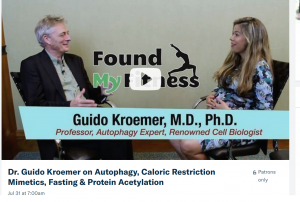Autophagy for Life Extension: Rhonda Patrick
Kristen Sparrow • September 11, 2017

 Rhonda Patrick’s blog is focused on longevity research. She is a biochemist by training, but now devotes her time to making the arcane world of biochemisty research on aging accessible to the lay public. (In a recent podcast she discussed how she came to the decision to turn down a tenure track professorship at a major university so she could devote herself to her blog. We benefit from this, but I find it remarkable that she would turn down the opportunity to participate in this research and choose to report on it instead.)
Rhonda Patrick’s blog is focused on longevity research. She is a biochemist by training, but now devotes her time to making the arcane world of biochemisty research on aging accessible to the lay public. (In a recent podcast she discussed how she came to the decision to turn down a tenure track professorship at a major university so she could devote herself to her blog. We benefit from this, but I find it remarkable that she would turn down the opportunity to participate in this research and choose to report on it instead.)
(There is a pretty good rundown on autophagy and its benefits here. Exercise, fasting, and very low carb diets are the key points.)
This interview with Guido Kroemer discusses the process of autophagy, a key concept in longevity, cancer, and neurodegenerative diseases. It is the process by which cells “eat themselves” to rid themselves of old cells and redundant proteins. The interview is available for subscribers to Patrick’s blog only. I wanted to note a few aspects of it here.
Dr. Kroemer eats one meal a day (dinner) and has smelly cheese and red wine with his food. He does two prolonged fasts (5 days) twice per year. You can read on to see why.
Fasting. Fasting has been explored extensively in mice and caloric restriction (30% of normal calories) can lead to a 20% life prolongation. Alternate day feeding of mice (normal calories one day, water only on alternate days) has the same effect and is better tolerated.
Ketosis. Fasting for days leads to ketosis, wherein you have used up any carbohydrate stores and use fat for energy. This has benefits for cells, mitochondria, because it leads to increased autophagy (cleaning out of debris.)
Coffee. When fed to mice in their water in appropriate doses in conjunction with fasting increased autophagy. More with caffeinated coffee, but also with decaffeinated coffee. Dr. Kroemer makes that case that coffee consumption is beneficial for cardiovascular healthy and decreases neurodegenerative diseases.
Autophagy inducing chemicals. There a number of these. Resveratrol, as found in red wine. Spermidine as found in smelly foods such as cheese but also lentils, fermented soy beans and other foods. But interestingly, one can also increase the amount of spermidine in the body by inducing the microbiome to produce it (your intestinal bacteria) by taking certain probiotics. In particular Bacteroides thetaiotaomicron and fusobacterium varum (from a Japanese study.)
Food avoidance when ill. The evolutionarily-conserved sickness response (food avoidance) is a way of beneficially altering immune responses through through altered metabolism and autophagy.
The addition of autophagy inducing chemicals (spermidine and others) along with chemotherapy helps to decrease the lethality of malignant cellsby stimulating immune surveillance.

